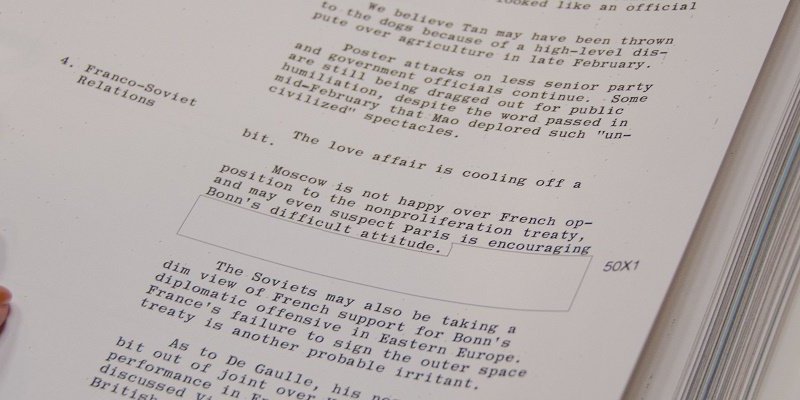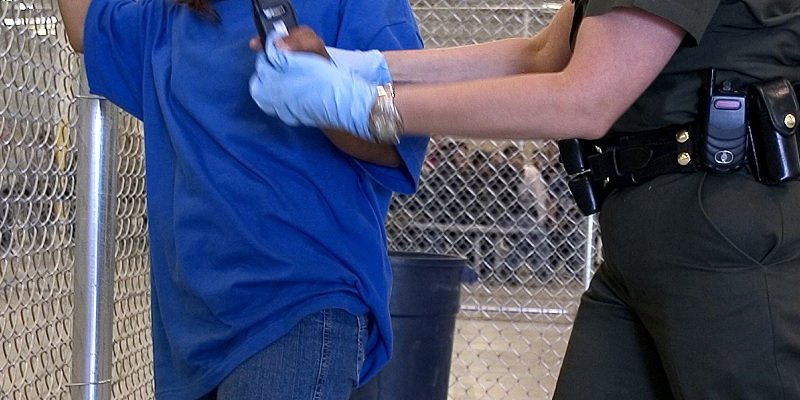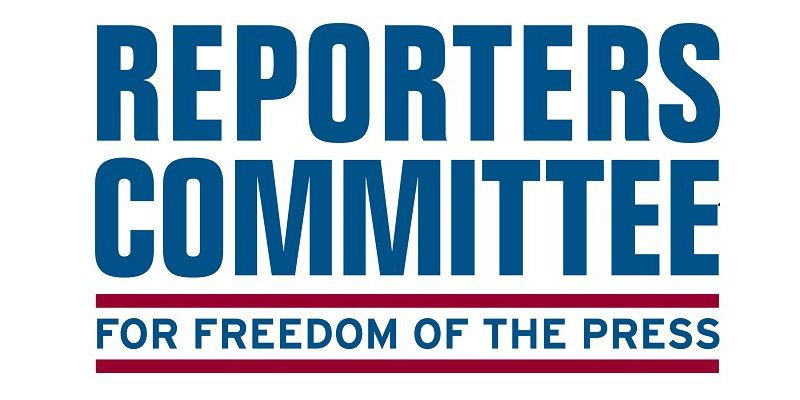-

Hanson, Massachusetts refuses to release report it had previously released five years ago
A police chief resigned in 2012, pressured in part by an investigation by a private firm. Its findings were soon released to area papers, but years later, the same town refuses to release the same report, claiming that it now has the authority to keep private the findings and its past malfeasance.
-

CIA worked with White House to kill probe into Noriega’s drug trafficking
The Government Accountability Office investigations into Central Intelligence Agency-linked illegal activities are often stymied - a process well documented in files discussing the GAO’s attempt to investigate General Noriega’s ties to drug trafficking, and what the Intelligence Community knew, and when. Documents previously leaked to the Washington Post have now been declassified, confirming the Post’s reporting and providing new details about how CIA blocked all of GAO’s audits touching on any subject which required oversight.
-

Biloxi wants to charge $5,000 for records on their rape kit backlog
In our efforts to uncover the rape kit backlog and report on the extent of untested sexual assault evidence, we often face the hurdle of public records fees. However, the Biloxi, Mississippi police department far surpassed any amount we’ve previously seen, asking for so much money as to render these documents essentially impossible to obtain.
-

Declassified CIA memo shows how long it took for the US Intelligence Community to take the Iranian Revolution seriously
A declassified CIA memo on the eve of the 1979 Iranian Revolution shows the Carter administration scrambling for a basic grasp of the details mere months before the Shah was overthrown.
-

FBI continues to delay release of files on the 1981 “Octopus Murders”
We know many things about the 1981 triple murder of Fred Alvarez, Patricia Castro and Ralph Boger. We know that the bagman for the hit, Jimmy Hughes, confessed. We know that a 2010 trial was interrupted when charges were abruptly dropped and evidence lost. We know from witness statements that the murders appear to be connected to the corruption surrounding Wackenhut and the PROMIS affair. We know from FBI’s own records that the Bureau looked into the matter. And most recently, we know that the FBI has not only repeatedly refused to release those files, but apparently removed the request from their FOIA tracking system.
-

The Private Prison Project heads to Florence, Arizona
Beryl Lipton’s research trip to the desert mecca of for-profit detention is derailed by broken computers, misinformed security guards, and police on the look-out for “suspicious activity.”
-

When Congresswoman Bella Abzug and the CIA went to war
Congresswoman Bella Abzug infamously had issues with trusting CIA when it came to their handling evidence of illegal and improper Agency activities. Internal memos shows those fears were well-founded - while the Congresswoman fought to prevent the destruction of records of CIA wrongdoing, the Agency rushed to begin destroying everything they could.
-

Harrowing audio clip reveals unlicensed bounty hunters running amok in North Dakota
After filing near 50 public records requests tracking regulations that may or may not exist on bail enforcement agents (also commonly called bail recovery agents or bounty hunters), is that the industry is almost entirely devoid of any meaningful oversight. A perfect illustration of this comes to us from North Dakota’s Insurance Department, which helpfully provided a lone audio file concerning a violent struggle by an unlicensed bounty hunter team, and a single complaint written by a woman whose brother had experienced the wrath of an abusive bail agent.
-

CIA’s release of ORIS database could change the way FOIA requests are made to the Agency
In 1985, citing concerns regarding “difficulty determining what has been publicly disclosed,” the CIA had a truly great idea that would serve both the Agency and the public’s interest in government transparency - a “proposal to establish a focal point to record CIA information released to the public.” The resulting Officially Released Information System, or ORIS, would take years to finally implement, and thanks to a recent FOIA, it might finally become the transparency tool it has the potential to be.
-

FOIA’ing Dixie: A look inside Corey Stewart’s Confederate carpetbag
Curious to see what the email inbox of controversial Gubernatorial candidate Corey Stewart looked like after his comments attacking proponents of removing Confederate Statue, Virginian native Tom Nash filed a public records request. After some pushback, the commonwealth relented, and what they released makes for a fascinating read.
-

CIA memo highlights the dilemma of declassification
One of the dilemmas of reading declassified documents is that readers are constantly faced with the question of whether or not to take the exemptions at face value - after all, CIA redacts beer brands and cafeteria names while claiming to “protect sources and methods.” Doing so erodes faith in the Agency’s choices to redact certain pieces of information, creating a situation where one of two possibilities are likely: that the CIA chose to improperly redact information to protect itself from embarrassment regarding improper activities, or that some of those activities are still seen as at least potentially valid.
-

The year before his murder, Malcolm X was under electronic surveillance by the FBI
The last section of Malcolm X’s 10,000 plus page FBI file concerns the Bureau’s electronic surveillance of the activist shortly before his death. For months, agents listened to X’s phone calls, photographed his comings and goings, and even considered bugging his Queens residence - only to hastily discontinue the operation for fear it would taint a potential conviction.
-

Hawaii’s new program aims to end their rape kit backlog
Hawaii has 1,951 untested rape kits, some dating back to the early ’90s. However, a new program created by a working group of police departments, sexual assault treatment programs, and prosecuting attorneys seeks to fix that by examining other evidence collection policies across the country.
-

Trump administration looks to private-public partnerships for infrastructure overhaul
In the next few weeks President Donald Trump is slated to release a highly-anticipated plan for an overhaul of the nation’s infrastructure, and with an anticipated total tag of nearly a trillion dollars, there will certainly be plenty of feeders fighting at the trough of public funds.
-

Oregon Department of Education wants over $250 for its Non-discrimination policies
The Oregon Department of Education has responded to a request for LGBT protections within their schools with a fee estimate of $260 - over five times the previously highest estimate we’ve seen for the same information.
-

The Undying Octopus: FBI and the PROMIS affair Part 2
As the FBI file show, the PROMIS case was not only far reaching, with ties to corruption, murder, and Iran-Contra, but purposely obstructed. While at least some allegations were confirmed by sources and documentation, others were blocked in their entirety - with critical evidence being lost and destroyed by both Congress and the FBI.
-

Fate of family detention centers will be left to the courts
The houses of the Texas State Congress effectively split on whether to consider immigrant detention centers as “child care”-like facilities, keeping a federal judgement on acceptable standards for family detention in place for now.
-

CIA considered working with the creator of “Dragnet” on a TV show about the CIA
In 1982, former CIA Director Richard Helms was approached by Dragnet creator Jack Webb about a possible TV show regarding the Agency. Like Dragnet, which, it would focus on realism, and would be at least inspired by, if not based on, events that had happened.
-

Social media surveillance is growing in the wake of Geofeedia’s demise
Though major social media networks, like Twitter and Facebook, rescinded access to their APIs from early surveillance software leaders, the market for multi-platform peeks into citizens’ daily digital lives continues to thrive.
-

Confidential champagne memos expose CIA’s East Coast-West Coast beef
The “friendly” rivalry between America’s East and West Coasts extends from hip-hop feuds to pizza bagels, and recently unearthed memos regarding California champagne from the CIA’s declassified archive shows that even the Agency isn’t immune.
-

The Undying Octopus: FBI and the PROMIS affair Part 1
The PROMIS affair, once labelled ‘the scandal that wouldn’t die,’ lives on according to a recent FBI FOIA response. The affair centered around the government’s theft of the PROMIS software, a forerunner to the infamous PRISM, and the far-reaching fallout which allegedly included everything from fraud, to covert operations and surveillance, to Danny Casolaro’s mysterious death, and remains the subject of an investigation decades after the Department of Justice declared the matter officially closed.
-

Police departments across the country are spending millions on riot gear
We’ve all seen the lines of police at protests donning head to toe armor, batons and/or launchers at the ready, glowering down at protesters through face shields. But how much does all that gear cost? According to the early returns on riot gear budgeting requests we have been filing, quite a lot.
-

Despite three separate instructions not to, the CIA still destroyed Iran-Contra evidence
A decade after Congresswoman Abzug had struggled with CIA Director George Bush over the destruction of evidence of CIA wrongdoing, the Agency’s Office of the Inspector General ignored the moratorium on destruction of relevant materials and destroyed several memos from the Iran-Contra investigation. When this was raised with the Agency’s Acting Director, it was played off as no big deal and the employees were praised for responding “remarkably well” to the investigation.
-

Read the Justice Department’s guide to using psychics in police investigations
Police psychics have so saturated popular culture that the concept borders on the cliche. There was a time, however, when the Department of Justice took the matter very seriously - not only were instances reported of the police using psychics, there were studies on the matter, and even guidance issued by the DOJ.
-

How Reporters Committee for the Freedom of the Press can help with FOIA
If you’re trying to master the art of public records, there are few better places to start than the Reporters Committee for the Freedom of the Press. Since 1970, the non-profit has served reporters across the country in fighting to open up government. Here are RCFP’s tips from our recent Slack FOIA Chat.